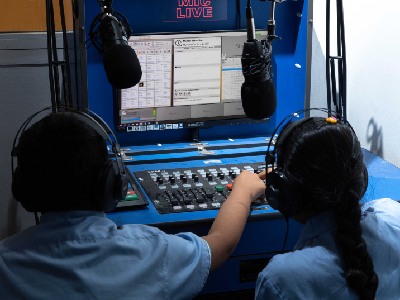High student engagement is essential to promote learning. The more students participate in classes, the more ideas are bounced around and the livelier the discussion becomes. The end results, a more involved classroom, who is eager for the next session.
Here are a Few Ideas You’ll Want to Try Out
At GIIS Dubai we realise that to improve engagement, there are plenty of things that schools and teachers can do.
1. Create a learning environment that encourages active engagement
For in-person classes, we arrange the room in a way that allows for maximum participation from all our students. For online classes, it is important to create an engaging lesson to grab the student’s attention. It is difficult for students to get distracted and bored, and teachers need to make the students feel comfortable and energetic enough to participate in online class. Asking questions of individual students, debates or discussing interesting concepts around the subject are great ways to create an engaging environment. It is important that students do not make fun of each other but provide support to each other!
2. Make Your Expectations Clear
Another way to encourage class participation is to make expectations right off the bat. It is important that on the first day of school that the teachers expect them to take part in classroom discussions. We set expectations for students from the first day to remain the best CBSE school in Dubai. It could be as simple as letting them know the steps they need to get good grades, and the lessons which are more important than others. Setting expectations early on will help them adjust their mindset and how they’ll approach online sessions.
3. Know Their Names
It is imperative that teachers at GIIS Dubai know the name of all the students they interact with and teach. When teachers show students who they are, it is crucial to building engagement. Students are more likely to listen in class and take an active interest in the discussions when they know that their teacher sees them as an individual, that they are not merely an anonymous part of the group. Giving that courtesy to students is essential to improve engagement and get them to pay more attention in class. Teachers should encourage them to address their classmates when they’re reporting or answering a question. That will help get them into the habit of directing their comments to one another or talking with each other, which should eventually enrich your discussions.
4. Assign Responsibilities
One way to encourage students to remain active is to give each child responsibility. Ask them to develop guidelines like ‘don’t interrupt when someone is talking or making a point.’ Some other ideas for guidelines could include: “critique the idea and not the person.” Students who are invested in making the most out of class, who want to get a good grade, will probably work with these guidelines right from the beginning. Teachers could also ask the students to lead discussions or submit questions before a class.
5. Request for Suggestions
Over the years, we have realised that many students are shy and dislike it when called out in front of the entire class. That is why we ask teachers to encourage anonymous suggestions. Teachers could read all the submissions out loud in class and decide which ones will benefit the entire class if implemented. The suggestions could also touch on issues that teachers might not have noticed until today. Maybe students resent having the discussion dominated by one or two students. Perhaps they want a different teaching style or method. Or perhaps they’ll say how much they love the idea of using learning apps for some lessons. Teachers recognise that being critiqued by students is a great way to make the classrooms more energetic and increase engagement.
6. Vary Your Teaching Methods
Repetitive teaching styles, and methodology is a major reason for students to lose interest quickly. It is important for teachers to vary their teaching styles. At GIIS Dubai, a leading CBSE school in Dubai, we hold regular training sessions and seminars for students to encourage them to add a bit of spark to their classrooms. We ask our teachers to experiment with trying out different styles that bring in the desired results. By changing teaching methods, teachers keep boredom from settling in. Online school classes lead to restless students, and we do not want them yawning and falling asleep. Methodologies that encourage participation and excitement are important, and hence the need to keep experimenting with different styles of teaching is essential.
7. Encourage Questions
One of the most important things teachers need to do is to train students to ask questions. Teachers should encourage their curiosity, so let them ask questions. That also means answering their questions whenever they have any with reasonable explanations. Many traditional schools would rather have children listen to their teachers’ lecture and save the questions for later. But that cuts off a potentially meaningful discussion. Organize classes that include plenty of chances for children to ask and answer the questions. It is essential to keep the discussion going, and hence, preparing follow-up questions in advance is advised. It provides a good measure to assess the student’s learnings. Teachers can use the input to help students learn more. Instead of the traditional model that only encourages questions at the end, opening the entire session to questions and a discussion might mean taking the longer route, but it also aids cognitive development in the children.
8. Give Them Time
Many teachers make the mistake of expecting an answer immediately. They forget that a student is learning many subjects, and they may need time to organize their thoughts. According to Edutopia, it is important for teachers to wait for 5-15 seconds instead of the 1-2 seconds to think about their answers. That time will help them get their thoughts in order and give them more confidence in their response. The more time you give them, the longer and complex their answer might be. Don’t be afraid of the silence.
9. Be Observant
Very few students will raise their hands in the air and volunteer an answer, though. But observant teachers will see who is engaged and interested, and can pinpoint those students who actually know the answer but might just not want to raise their hand. Asking the students who do not voluntarily give answers can help break barriers and boost confidence. Be sensitive to any non-verbal cues, like students making eye contact or smiling. Encourage them to speak up in class, as well, and this encouragement might be all they need.
Also Read: Important Things to Remember for Exams
10. Listen Fully
One important lesson for teachers is – Don’t interrupt when students are talking. It can lead to incorrect assumptions and can prevent the students from fully voicing out their thoughts. Wait until the student has fully expressed themselves, before taking the conversation forward.
As a leading international school, we realise that active participation doesn’t happen overnight. But exploring these ideas and putting them to use helps teachers raise students who are curious and confident.




























